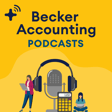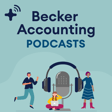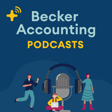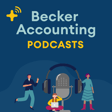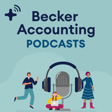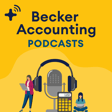Introduction to ESG's Relevance
00:00:09
Speaker
I'd like to thank everyone for joining us for another conversation. Today, we will be talking about ESG, and I know it's top of mind for a lot of professionals out there today.
Lucy Turnage on Community Involvement
00:00:20
Speaker
So I'm so excited that Lucy Turnage has decided to join us. She's an executive leader with Bank of America, and she probably has an opinion, and I'm looking forward to what you have to say about it.
00:00:32
Speaker
um I'm just so warmed by the fact that when I have leaders here, that they always are so busy. Busy not only at their jobs, but being plugged into the community the right way. Share some of that with us. How you're plugged in into the community is something that I don't know about you because I've read your bio. So I'm going to let you do that.
Future Impact of ESG on Business
00:00:55
Speaker
I'm plugged into the community because I came from a place where there aren't a lot of accountants that look like me or are from my area. I'm originally from Brooklyn, New York, um Crown Heights. Brooklyn. And um it's important to me to be plugged in by giving back as a mentor.
00:01:15
Speaker
to students. I go back to my alma mater, Damon University in Amherst, New York, and I talk to students about accounting, finance, different careers because my career has spanned many different roles, and so I like to talk to them about the different possibilities that they can experience. And I also like to talk to young professionals about how to develop and grow in their career. And it's really, really important to me because I've had those people kind of point to me as I have grown up. And so, Navajo lifting as we climb, very, very important to me. Fantastic, fantastic.
Role of Stakeholders in ESG
00:01:56
Speaker
My first question, ESG, when I mentioned ESG, what does that mean to you?
00:02:03
Speaker
I think it's about... Like for me, it's it's about like how the future of accounting and reporting is going to look, right? To me, it evokes like the next wave of how we are going to run and report on our business. I feel like for years we have looked at our business in one way and it's kind of time to broaden and expand our knowledge and talk about the things that are going to impact our business and share that with
00:02:36
Speaker
the, you know, the public. So, because ESG and sustainability and trying to figure out how to, what that looks like, large organization, small organization. And one thing that comes to me it comes to mind to me is always stakeholders. You got a lot of people that have expectations as it relates to yeah ESG, whether that's You know, customers, whether that's your own employees, whether that's supply chain. I mean, how do you feel
Addressing Greenwashing Challenges
00:03:04
Speaker
about that? When I say ESG and stakeholders, because you understand the difficulty and the challenges, what does that mean to you?
00:03:11
Speaker
There's so many people in play here, right? So you have your investors and there's different type of investors, right? There's the investors who just, they want return. They want money on their return. And then there's some investors who really care about the environment and the impact of what we do and how we run our business.
00:03:32
Speaker
how that impacts the environment. So the stakeholders are different and everybody's expecting different things. And I think like ESG needs to kind of have a balance so that all of those people are getting what they want. And so that's that's kind of like what I think about it. You know, when I think about ESG, another thing that comes to mind is zero emissions. Is that possible?
Government's Evolving Role in ESG
00:03:57
Speaker
I mean, I fake that my twenty thirty i'm ah twenty thirty yeah twenty thirty five whatever because yeah yeah you know i think that I think that it is possible, um but i but I also think that it's how are we going to get into a landscape where people aren't greenwashing those reports, right? So it's it's all about how do we get to a place where we, you know, similar to like, you know, the way accounting evolved, right? Regular accounting evolved by us creating these generally ah ah accepted accounting principles.
00:04:39
Speaker
How do we create those same type of principles with ESG? And so I think that we are in the infant stage of that now. And I hope that we move forward with that as opposed to kind of stalling and going in a different direction.
00:04:57
Speaker
You know, my my understanding of that timeline is that we need to do it more sooner than
Political Dynamics and ESG Adaptation
00:05:01
Speaker
later. But, you know, when I think about the urgency of the sense of urgency and what the government is doing and the impact they have on that happening, what do you feel about that? Because I know at first the government was out front and we we do as we're told.
00:05:19
Speaker
is putting that out there, we do as we're told, um but it seems like they pull back a bit. So what, ah because I know from a consulting perspective, because I do a lot of consulting, we all thought we'd make it rich off of ESG and that will not be the case. It has changed.
00:05:35
Speaker
I mean, what does that mean to you when I say, you know, they pull back the government's involvement? I mean, what what did you expect? Well, I expected the same thing. i I think I heard about ESG and I was like, oh, this is the next wave. And I started looking at different certifications that I can get so that I can specialize in it. And it was interesting to me, like to see It evolved like watching it in political commentary on different networks and seeing how what we thought we in the accounting field and what we thought as kind of like the next wave, something that's important.
00:06:16
Speaker
um for the next phase of
Social Dimension of ESG
00:06:18
Speaker
how we report um evolve into kind of like a political issue um where we're like saying ESG is is a bad word like to ah you know to the point where you know institutions are actually changing how they you know refer to it and so not you know not saying it so it's it's very interesting to me how You know, we went full swing and this is how we were going to go. And now we're kind of pulling back because of what I believe is a political um issue. It's not a political issue, but it's been turned into a political issue.
00:06:58
Speaker
When I think about the ESG and I think about the social piece of it, that's the part that sticks out to me. And that's what I i could embrace. as I was a chief diversity officer. I've been in the community in a different way. I value opinion. What sticks out to you when I say ESG? What part of it?
00:07:15
Speaker
I mean, I i i believe in the social the social part as well. And I think that the financial institutions, banking institutions in general, have a responsibility to, you know, support the communities that they are, you know, in that you know investing communities that they're working in. That's part of their, you know, they they have to do that as part of the regulation.
00:07:40
Speaker
And I think that most of the financial so institutions have to you know have been doing that and will continue to do that. So I don't think that that piece is changing. I think that the piece that we need to focus on is the part where environmentally, right? The piece that, you know, when we think about the the damage that we're doing to our environment and how that impacts us financially, the stakeholders, we need to figure out how we incorporate that into our financial reporting so someone can make an informed it decision about how
00:08:22
Speaker
you know, hurricanes that are happening in, you know, in numbers that we haven't seen historically, how that's going to impact your business because it's going to impact a lot of businesses if you have to shut down because there's floods or because people have to move out of a certain area because of, you know, the impact of these storms and things of that nature.
00:08:42
Speaker
So we always think it's very large organizations that should be concerned about it, but we all should be concerned about it. And I think about a mom and pop. I think about a home. I mean, we can all do
Small Business and ESG Contributions
00:08:54
Speaker
something. So when I look at you and I look at myself, I'm going to say, what am I doing? Is it really a CSG? What car do I drive?
00:09:01
Speaker
Do I recycle? you know What am I conscious of as it relates to all of those different things? What do you think it looks like for a small business? Because small businesses say, well, you know that's really not me. what ah What does it look like for them? I think that this impacts all businesses. Because if if you have to close down your mom and pop shop,
00:09:26
Speaker
for any amount of time because of a weather-related issue. And that's not the only issue that it can impact, but because of a supply chain issue that's impacted because of the weather, like it's going to impact you. So I think that the way to think of it holistically is to think about if you you are passing this place, this earth off to the next generation, how do you leave it better and
Crafting ESG Strategies with Feedback
00:09:55
Speaker
And so just thinking about that in the decisions that you make, um um I went, I recently went out of the country and um went to a place, Bahamas, and- Great place. Great place, great place. I noticed that like,
00:10:12
Speaker
You know, they are very stringent about the things that they use. All of the straws were like biodegradable. We went into certain areas and there were like no straws beyond this point. A lot of the water was in water cartons.
00:10:28
Speaker
or in aluminum cans. And I was like, it's not like we were very far. we you know Why can't we do the same thing here in the States? like I predominantly see water in water bottles. We're sitting here in a hotel and they're in water bottles. That's what they do. Why can't we make those same changes in in our everyday? And so when I think about a mom and pop store, if you are selling food, like Can you get it in aluminum cans? you know like can you Can you provide things in a way that's more sustainable for the environment? So when I think about ah ESG and I think about coming together, I mean, how important is it to solicit feedback? And what I'm talking about, I've got employees. I've got customers. i've We're doing this together. How important is it to get that feedback as we're building out that plan for success?
00:11:25
Speaker
Oh, it's it's so important because the voice of your employees of your state, but those are the people who are making the decision whether to invest or whether or not to invest in you and and this.
00:11:37
Speaker
ah you know i you know This younger generation has ideas about how to be and operate in better places and spaces. So why not solicit feedback from them? And you know it's probably free. you know So um so it's it's a better way to be ahead of the curve as opposed to responding to not getting that feedback and maybe like not doing well in terms of your business after the fact.
00:12:05
Speaker
get the feedback for free ahead of time, and your business may, like, expand and
Younger Generations and ESG Priorities
00:12:10
Speaker
grow. Another thing I'm thinking about, I would make, it would someone make a decision to join an organization if they had a good plan as it relates to sustainability? Because we think that I know college students are very conscious of the environment. So would they go as far as to say, well, I don't want to work for this company because of their practices as it relates to sustainability?
00:12:34
Speaker
Yes, yes, yes. So i I had a young right out of college student working for me at an organization and had a job offer, had everything, and she turned it down to go work for an organization in Colorado that was more yeah ESG friendly.
00:13:00
Speaker
And so i I mean, she wasn't from Colorado. She moved away um from you know her home and it meant that much to her. And so I don't think this next generation of you know, students, professionals are going to kind of put their head down and um go with the flow. I think they're protesting by doing and and operating in ways that our generation didn't. Like we kind of just kind of did what we were. So they they're protesting in different ways and showing what matters to them by by turning down
00:13:44
Speaker
job offers um um and maybe making less money um to do and work in places and spaces that they agree with.
Consequences of ESG Implementation
00:13:54
Speaker
So when I think about if you get it right and if you get it wrong.
00:14:00
Speaker
So when I say that, I mean, what does that mean to you as a really similar organization? Because I i understand what it might look like if they get it right. But if they get it wrong, and I think about things like reputation and some other things, what does that mean to you when I say that in those two buckets and how would you add and or subtract from that?
00:14:21
Speaker
I think getting it right would mean kind of the engagement um and from from your employees, right? Like your employees are engaged, are happy with some of the things. You know, you're not going to agree on everything, but they're happy with what they see are the important things that matter to them. And so they are staying at organizations, they are not leaving.
00:14:45
Speaker
However, getting it wrong means that you can lose a generation of ah yeah a generation of professionals because they don't agree with your policies. They don't like the way you operate. They don't like how you do business. And as we've seen from protests that are happening on college campuses, students and and our who are going to be our future professionals, they're not um they're not just going to put their head down and you know do what is told of them. They are going to align themselves with organizations that align with their moral compass and and what their beliefs are.
00:15:29
Speaker
So I think about front and runners in an industry. Okay, I'm not picking on your company, but a company, those that are in positions of influence and the actions that they take.
00:15:40
Speaker
How important is it for them to step up? Because they have a lot of buying power, they a lot of have a lot of influence over the supply chain, and quite frankly, others are waiting for them to respond before they even decide to build a plan. So how important is that to be, if you're out front, to be that example, the right example?
00:16:00
Speaker
I think it's kind of like ah being ah best and first in class. I think it's so important. And I think that if you are the first ones out there, if you are able to be an example, you will be able to attract.
00:16:17
Speaker
the talent that's coming right out of these schools. And so you'll be able to have like, you'll be able to just choose the best of the and of the brightest because you'll be able to track. And I also think that it's not only important to be kind of like the first and the ones who are out there, but I also think that you should bring other people along. Like you shouldn't just um be responsible, you should also try to get organizations on board with you because it's that important. Well, supply chain is waiting on me because of my buying power. This is the way I see it. They're waiting on me. I control that. I have expectations. They are a stakeholder. Some may opt to do business with me or not make that and investment investment with me, but I can influence that relationship in a different way. Also, when I think about my employees,
00:17:11
Speaker
the human capital piece of it is so important nowadays. And it's always been significant. ah So you can't deny that. So you're constantly getting that feedback. Then you think about your shareholders. Shareholders make decision, do I want this stock or not? Or do I move away from it?
Leadership's Influence on ESG Practices
00:17:28
Speaker
And I've seen really impressive you know portfolios when it comes to cash. And now I'd say, well, I don't want to work with this business. I don't want to have an investment in this business. So I'm going to pull my stock out. okay So it's so important that, and it's the pressure is where i'm where I'm going with it. If I'm a large organization and I've got a significant influence in the market,
00:17:52
Speaker
and all of this pressure on me to get it right, I would be afraid to make a decision not to do it or not to make sure I've got the right sustainability plan in play in order for for me to be successful in the business to be successful. So that's you know that's that's just the way I look at it, all right? I think that like when when you think about it from that standpoint, I go back to like financial reporting.
00:18:17
Speaker
who have the same pressures on you um in financial reporting to be profitable, to make the stock go up, to you know get... you know so that I mean, that's why they get paid the big bucks, got to make the decision. And so you will make mistakes and you you know you sometimes will make the right decision, but I think it's kind of like the same way we are comfortable kind of in Like being grounded in financial decisions, you have to be grounded in that same way with ESG and and and you got to stand behind your decisions and sometimes you will make mistakes, but you you you learn from them. And I think you you know it's just as important as the financial side because it it it is so tied
Transparency and Sustainability Reports
00:18:59
Speaker
together. You can't separate it.
00:19:01
Speaker
So what do some of those key components look like generic as a generic plan out there as it relates to building that infrastructure? What are the some of the blocks that need to be in place? I think it's like understanding how what you're buying power is, how that impacts the environment. I think that that is one of the most important things. I feel like it's also tracking your green footprint in the environment. And it's also putting numbers or putting out scenarios um of like what what it will like what it looks like to have certain events happen. like
00:19:49
Speaker
10 hurricanes hitting, you know, you have to kind of look at all of the scenarios, but I think that it's really important to to to tie it back to the numbers, but also tie it back to kind of like, how is this impacting our business, right? So.
00:20:06
Speaker
I think one thing that I read um along these lines was it starts with leadership and senior leadership stepping up and saying, hey, we've got to develop a campaign around this. We've got to build out the infrastructure, whether that's a committee.
00:20:21
Speaker
And it's a committee of key business leaders within the organization that say, how are we going to tackle this? And then we bring and we invite our employees in in a different way and solicit their input. And then we go and we say, hey, my customers are important. So how often am am I getting all this feedback? And once I get all of this up from supply chain and every and understanding from a governmental perspective, kind of their position on it. And how do I create something for success, a plan for success?
Adoption Rates of ESG Practices
00:20:52
Speaker
ah Some organizations get it, and i look at the and i' I'll toss this out when I say sustainability report.
00:21:00
Speaker
I mean, i they've gone to that extent to say it's that important. And I want to message it back to the community, what we're doing. So I see some doing that. So how do you feel about that? Those that take that step and they have a sustainability report that reflects their efforts. How does that make you feel? I mean, it makes me feel like they're on the cutting edge of what we need to with what we need to be doing. And I think it's so important um to continue to do that and not and not be swayed by whatever the government is doing. You can do the right thing and be a leader without the government telling you this is what you have to do. You can do it just because it's the right thing to do. And I think that the organizations that get it are
00:21:53
Speaker
going to be reporting on things whether they're required to or they're not. And they're not going to stop the process or try to impede the process by, you know, you know pointing fingers at the government. They're just going to do it.
00:22:09
Speaker
Yeah, I think about the overall transparency and just you know making sure that um the world understands their position and employees respond and they react and you've got supply chain and others within your industry look at you differently and say,
00:22:27
Speaker
Some don't know when this and where to start. And if they see you step out and they look at your formula, then they say, well, maybe we need to get our act together and start making sure that we get things aligned. So it's not going away. And I think people think since there's a different lens on it now that it's going away, it's not going away because it's it's vital that we get it
Training and Personal Responsibility in ESG
00:22:48
Speaker
right. Yeah. And it's it's interesting. um I, you know,
00:22:52
Speaker
take continuing professional education classes and just looking at over the years of all of the advice about what was going to come down with the final decision and seeing how like what people thought versus what actually came down the pipeline. It's like it's not predictable, very different, um but it's not predictable but at the end of the day you should be doing the right thing because like whether you do it or not it's going to impact your business. Whether you report on it or not it's going to impact your business because if you can't operate because of some some event that happened it's going to impact your business. So to lighten the load on me lighten the load and I lighten the load via education and you keep mentioning oh you've taken some courses
00:23:44
Speaker
you become more aware. How important is it? We are training our employees so they can take some ownership in doing things within the community and how they respond to it. How important is training?
00:23:58
Speaker
I think training is really, really important. And I think that you know whether the the training is generated from an organization pouring into their employees, I think, I guess me personally, I've always been one to seek out knowledge. So when this ESG thing was coming, I was like, okay, let's see what kind of certification, what kind of organizations can I get affiliated with so I can kind of, you know, go deeper. in And so for me, regardless to whether I'm with an organization that is going to train me on it or not, it's going to be something that the wave is coming. And so I'm going to, you know, find my way and not get lost in a storm.
Continuous Learning for ESG Proactivity
00:24:44
Speaker
Oh, wow. So when I think about questions that maybe I didn't ask, is there something that's on your mind that you want to share with the audience as it relates to this that maybe I didn't touch on? it
00:24:57
Speaker
I think the only thing is that ah to educate yourself by you know using Becker. you know and They are ah by far an organization that has helped me in my career um in terms of like helped me in in studying for my CPA exam and continuing with CPE courses. So I think that just lean into learning and don't stop learning regardless to whatever these rules that are coming um guided or not guided by the government. You should lean into learning and being at the front end of learning as opposed to kind of figuring out after something has been passed.
Diversity in ESG Decision-Making
00:25:42
Speaker
Awesome, awesome. You know, there's some some language out there when we say, and I'm gonna shift gears a little bit and talk about, since we're at NABBA, and we're talking about opportunity for those that are coming after us. And there are references to, okay, is there a seat at the table? Is there a bigger table? Is that, you know, how do we make and create this opportunity? How do you feel about that?
00:26:09
Speaker
And I know it's shifting gears a little bit away from ESG, but it fits because I think the social piece of it is what really matters ah as well. So how do you feel about that? I think the social piece is not going away no matter what we do. um The part of creating a seat at the table so that there's a diverse voice at the table is important because when you think about, we you know we were we we touched on briefly about like how do you make the right decision? You solicit feedback from your employees, but if you really created an opportunity for them to input
00:26:47
Speaker
at all levels of the organization. And even at the top of the organization, you might learn something because you might learn something that you weren't aware of. And so creating an opportunity for employees or the next generation to really have direct input into an organization's policies as it relates to ESG. I think it's so,
Advice for Career Success in ESG
00:27:09
Speaker
so important. In the social piece, no matter what organization you in you are in, it is important.
00:27:17
Speaker
So also, because you're an executive leader, you've been so successful. And I normally ask that, you know, you share what that looked like, what that right recipe, what what's one or two things that if someone was coming into the profession or someone may be experienced, needs needs to know. Because when we think about success, we think it just happens overnight and there's not a lot of effort in it. But what are those one or two things that come to mind for you when I start talking about success and what a young professional, someone who's more senior,
00:27:54
Speaker
would need in order to to to truly pave the right road for themselves. So there's a couple of things. One is continuing learning. Like, never stop learning. Like, never give up. Like, don't just finish school and think, I'm done with this. I am a fan of getting a certification, of taking an exam, of it it's It's the way I push myself and continue to evolve as a professional. Another thing is feedback. Soliciting and getting and actually listening to feedback in terms of how can I be my best self. And so it's something that in in my professional career,
00:28:45
Speaker
I think it's important because whether the feedback I'm giving is something for someone to improve on or something that they're just doing great. at I make it a point for anyone, whether you report to me, we work with each other to give people feedback on their performance. And I think the you know the you know coming up as a professional, that should be important. So continuous learning and feedback. And then the last thing I'll say is networking.
00:29:18
Speaker
I keep a ah board around me, and it's people that I go to that I talk to when I feel like I've reached a point in my career, and maybe I'm stuck a little bit. What advice you can give me? I talk to them about some of the challenges that I have, and they kind of give me ideas about how what I could do to make it better.
Personal Responsibility in ESG Efforts
00:29:38
Speaker
So I think it's so important to also have like a board, not just one person, but a board of people around you who you you admire, that you look at what they've done and you want to be like them, I think that that's so, so important. You know, I learned a long time ago, I have a sponsor, I've had mentors, and my very first job, my boss told me, you're responsible for your career. And I'm like, no, you're responsible for making me successful. and He's like, no, you're responsible for your career.
00:30:10
Speaker
So every day when you wake up, what can you do to make yourself successful? um And he said, if you build out a plan, you will be successful. Quit waiting on everybody. I know their coaches, I know their mentors, I know their sponsors, but it's your responsibility. So I just want to share that with the audience because I never have and I know I've asked this question before.
00:30:29
Speaker
oh Thank you. Thank you for making the time. Thank you for being here. Thank you for helping me do a deeper dive into ESG. And what I heard from you is that it's super important.
00:30:43
Speaker
One, two, it's not going anywhere. I think the lens of the government is not the lens of corporate. And corporate and corporations really are the driving factor behind this. um it's not um It's not just their job, okay? You've got the mom and pops that also can influence it. And when we think about how it starts, it starts with um leadership.
00:31:13
Speaker
And then we bleed down and we're pulling in employees and soliciting feedback from stakeholders. And those stakeholders are truly important because they are the supply chain. Okay. They are customers. Okay. All of this feedback needs to be consolidated and understood. So we're meeting the needs of the community. So, you know, in closing, ESG is super important.
00:31:39
Speaker
If you haven't thought about it, if you haven't read about it, if you believe that the government will take care of it, they won't. It is our responsibility. So think about what it looks like in your own home, because ah maybe it's the car you drive. Maybe it's how you recycle. it's Maybe it's your awareness and the message that you can deliver within the community.
Conclusion and Future Topics
00:32:01
Speaker
Just think about how you can impact it in a positive way.
00:32:06
Speaker
So be on alert for the next conversation that we have, because we start with ESG, we go deeper, we start, we go with AI, we go deeper. Just be on the lookout for that next conversation. My name's Chris Mitchell, it's been a pleasure speaking with you today.

